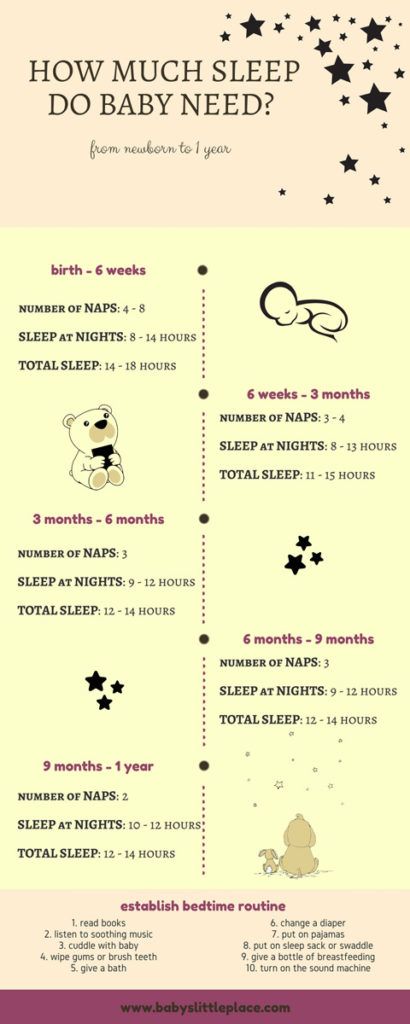
How much sleep does a newborn need?
The sleeping patterns of newborn babies are unique, determined by their temperament and level of development. Most newborns need about six weeks before they start sleeping longer at night than during the day. So, how many hours does the average newborn sleep per day? A lot! Believe it or not, some one-week-old babies need up to 20 hours of sleep per day.
But how much sleep does a newborn need? A newborn up to 3 months old needs 14 to 17 hours of sleep per day!
Of course, with months baby’s need for sleep slowly decreases. And when they turn one year, they need only up to 14 hours of sleep.
How many hours does the average newborn sleep per day?
| AGE | NUMBER OF NAPS | NIGHT SLEEP | TOTAL SLEEP |
| birth – 6 weeks | 4 – 8 | 8 – 14 hours | 14 – 18 hours |
| 6 weeks – 3 months | 3 – 4 | 8 – 13 hours | 11 – 15 hours |
| 3 – 6 months | 3 | 9 – 12 hours | 12 – 14 hours |
| 6 – 9 months | 3 | 9 – 12 hours | 12 – 14 hours |
| 9 months – 1 year | 2 | 10 – 12 hours | 12 – 14 hours |
For the first six weeks, you can expect your newborn won’t sleep more than two to four hours at a time, day or night. Later, most babies begin to sleep for shorter periods during the day and longer periods at night.
Newborn not sleeping enough?
If your newborn sleeps a lot less than 15 hours a day, you should figure out why. Usually, it is nothing seriously wrong, and you can help him on your own.
Maybe your newborn has baby colic or reflux. Colics are a common problem that is not a serious threat to your infant, but he does not feel comfortable! Unfortunately, colics won’t go down completely, and you will have to give it time to subside entirely, but you can relieve them in many different ways.
Find a natural colic remedy that will ease your baby’s colics and consequently provides a longer and better quality sleep.
If you think your infant has reflux, you can purchase special pillows that slightly raise the baby’s head while sleeping. These special pillows are very helpful because the acid does not escape into the esophagus.
The pillow is slightly inclined and must be firm! For the additional safety, place the pillow under the mattress sheet. It will stay in place and won’t compromise the baby’s safety in the crib.
How to help newborn sleep
Sleep is essential for your newborn. Not only because it has an impact on the baby’s brain and health, but because you need rest as well! Baby’s brain develops during sleep, and babies also grow while they are sleeping.
If your baby doesn’t sleep enough, she is cranky all day. That results in your tiredness and unhappiness. The family dynamic is lost, and you can’t enjoy the precious time with your baby as much as you should.
That’s why is my advice to you, establish a healthy sleeping routine as soon as possible!
And keep in mind … if your infant sleeps little more or less than an average newborn, don’t make a panic right away! If a newborn is happy and healthy, if everything is all right, and if you are happy, then why should you change anything? Every baby is unique!
Also, be prepared for your little one’s sleep patterns to change quite a bit from day to day in the beginning, and later after he reaches new milestones.

Getting newborn into a sleep routine …
… is a process where you have to be consistent and persistent!
Sleeping patterns from your baby are changing while she is growing, and that is normal!
You should start establishing a healthy sleeping routine right away. Of course, your newborn won’t learn it right away, but it will help. Newborns sleep whenever and wherever they want, as their sleeping patterns are still unpredictable. If a newborn is tired, you won’t be able to keep him awake, and vice versa, if he is not, don’t try to put him down to sleep.
But why would you start establishing a baby sleeping routine right away then? Because you will get used to it, and slowly pass it to your baby as well.
The sleeping environment also plays an important role in the quality of the newborn’s sleep. You must choose a safe baby crib, that suits your needs the most. Some parents decide for a bassinet, Pack ‘N Play, or co-sleeping in the same bed. But the CDC (Center for Disease Control) recommends sleeping in the same room as your baby, where the baby should be in his crib next to your bed, at least for the first six months.
How to establish a healthy baby sleeping routine?
Recognize a sleepy baby!
Your newborn may quickly change the state of drowsiness and alertness. Be aware of this and respond appropriately. If you recognize signs that she is tired, you are on the right path. Watch if she is rubbing her eyes, pulling on her ears, or being more fussy than normal. If you spot any of this, lay the baby to sleep immediately.
If a newborn falls asleep during the feeding or carrying around, put her in a place you settle for the sleep. That might be a bassinet, crib, or a stroller.
If she is awake, encourage her awakens and play with her. By distinguishing between periods of sleep and alertness, you will help the newborn linking sleep with the appropriate sleeping place.
Newborn’s Naptime
Naptime is important! Newborn can’t be awake for more than two hours at a time. An average newborn is awake from 30 to 90 minutes at a time.
When your newborn shows first signs of fatigue, don’t wait too long for a nap. If she is tired, put her to sleep, no matter what you are doing.
Newborn become quickly overtired! If that happens, your struggle begins, as she won’t fall asleep easily!
An average newborn sleeps 4 to 6 hours during the day, where his sleep is divided into 4 to 6 naps.
Newborns frequently confuse the day and night!
Learn your infant distinguish the day from the night as soon as possible! Babies sooner or later sleep more during the night, but lot newborns confuse the day for a night. Start making the difference between naps and night sleep on the first day of your baby’s life.
Create an evening sleeping routine before night sleep. Begin with quiet and calm games, reading, singing, or swinging, when the hour for going to sleep approaches.
Don’t make the dark in the room during the day! She will fall asleep, believe me! She will learn the difference between the day and night faster!
Treat night meals differently from day ones. Since your newborn baby has to eat frequently, she will wake up several times at night. To maintain night-time feeding less disturbing, you should make nightly meals peaceful, while daily ones should be more social.
You should feed your newborn immediately before she is completely awake during the night! Don’t talk with her! Don’t turn on the light! Keep the calm and sleepy atmosphere, so the newborn baby will understand that this is not the time for play.
During the day, do the opposite! Meals should be a social event, time to smile, sing, talk, and collaborate with your baby.
The same goes for changing the nappy at nights. Yeah, sometimes you have to do that too. Don’t change it for every little wee, today’s diapers are of good quality, and your baby will stay dry. But if you have to do it, change it quietly. Don’t talk with your baby, and change the diaper with a minimum light in the room. Don’t carry her around after you did the job just put her back to sleep.
Bedtime routine for a baby may include:
- reading books
- listening to soothing music
- cuddling with your baby
- wiping gums or brushing teeth
- give a warm bath
- changing her nappy
- put on the pajamas
- put on sleep sack or swaddle
- dimming the lights in the room
- give a bottle of breastfeeding
- turn on the sound machine
Teaching your baby to fall asleep alone
A newborn baby will fall asleep during the feeding, rocking, or walking around. They also like to sleep in baby carriers, as the natural rhythm of your walk and your warmth comfort them. But sooner or later, you will want to teach your baby to fall asleep alone.
So, encourage older babies to fall asleep alone. Try to accomplish this gradually.
Put baby to sleep when she is sleepy, but still awake. If you put her in a crib when she is half asleep, she will still feel your warmth and love. If you are lucky enough, she might start to equalize those feelings with the sleeping place.
I know that this is easier to say than done, but don’t give up! Keep trying, as sooner or later, the baby will get used to it.
Yes, an average newborn sleeps 17 to 18 hours per day, but don’t panic if your baby is sleeping up to 20 hours per day. Also, it is normal if she or he sleeps only 15 hours or even less.
Believe me or not, even if you are a first-time parent, you will know how many hours of sleep does your newborn needs. Why? Because you know her/him the best!
